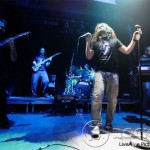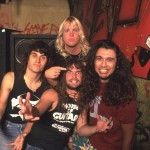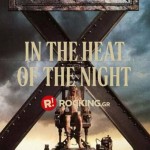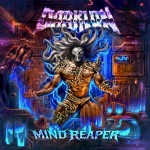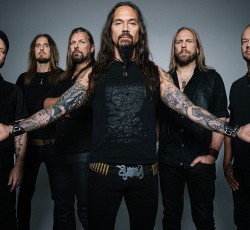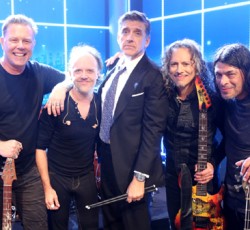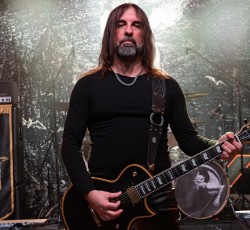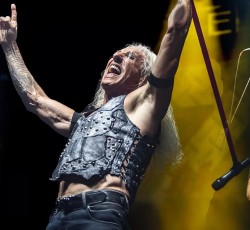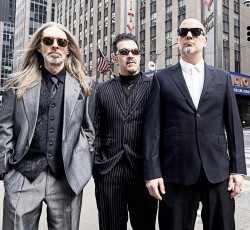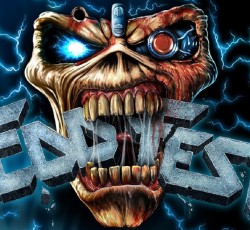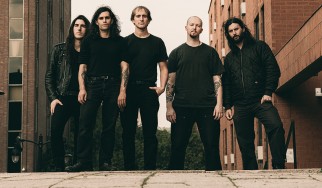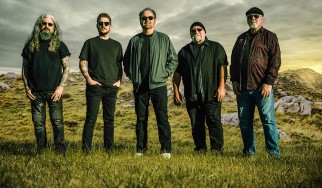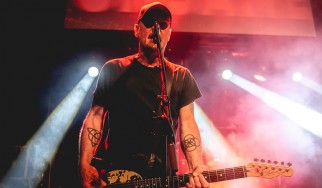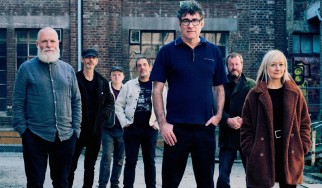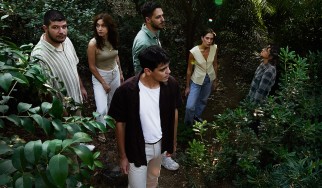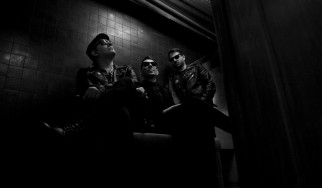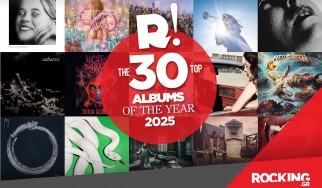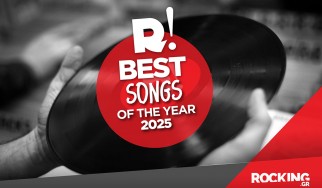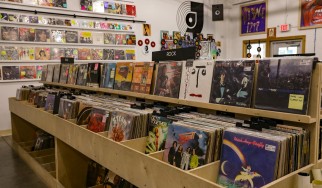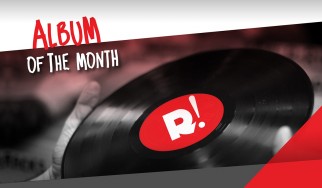Adrestia: "The ideas that are promoted within the punk community work for real"
The Swedish crust punks in an all-encompassing discussion about the punk community, the Swedish scene, Rojava, the twin recent albums, as well as their collaborative new record with Tomas Jonsson of the legendary Anti Cimex
Μπορείτε να βρείτε την ελληνική εκδοχή της συνέντευξης εδώ.
The Swedish Adrestia are one of the most high-quality and remarkable modern crust punk bands. Politicized, with strong influences from (Swedish) death metal, with each new release they establish themselves in the contemporary underground of the scene. 2022 found them releasing two records, the crust "III: The Betrayal" and the black/death metal "IV: The Mark Of Cain", records that proved their talent and compositional prowess. These days, the band returns with a four-track twelve-inch EP.
"Dead End Roads" though, is not a typical release. The new record finds Adrestia teaming up with the great Tomas Jonsson, the voice of the legendary Anti Cimex (also later in Wolfpack). The singer, who has guested on previous Adrestia albums, took over the vocals entirely on the album, for the first time since 1998's Moment Maniacs' "Two Fucking Pieces". On the occasion of this very special partnership, the main composer Martin Shukevich (vocals, guitars), and Elma Roth Sandell (bass), introduce the band, introducing us to their political philosophy, "Punks For Rojava", their musical experimentations, as well as every aspect surrounding their collaboration with Jonsson. Of course the conversation went to Anti Cimex and the Swedish scene!

Greetings, I am Apostolis and I eagerly welcome you to Rocking.gr! First of all, I have to ask you how you got your name, since it derives from an ancient Greek goddess! What does it mean for you?
Martin: Thanks! When we started the band, we spent a lot of time searching for a good name. I went through characters and terms in Greek mythology, and when I learned that there was a goddess of revolution I thought her name would fit our revolutionary ideology and feminist message quite well.
I also have to congratulate you for both of your recent great LPs! Before we dive into your new collaborative release, would you like to share with us the feedback you’ve received for the albums "III: The Betrayal" and "IV: The Mark Of Cain"?
Martin: Thank you! We haven’t received that many reviews actually, but the few ones we had were very positive. I guess it was a bit of an unusual concept to split one recording into 2 separate albums and release them at the same time. We've gotten very good responses on single tracks, and on the videos we released for "We Are The Storm" and "Järnmasken". I thought people would be more skeptical about the less orthodox elements on the records (sax, clean vocals and so on).
It’s good to experiment more with different music elements to find new sounds and for the music to evolve
These two albums showcase your love for both crust punk and extreme metal. How did you come up with the idea to experiment more and separately with these two worlds?
Elma: Because it’s good. We like it and the people who listen like it, and that’s enough. That’s what it’s all about. I also think that it’s good to experiment more with different music elements to find new sounds and for the music to evolve. But apart from that, as I said, what’s most important is that it’s fun and I think mixing the genres came quite natural.
The lyrical concepts are also different. "III", continues your political approach while "IV" comes with a more personal tone. What urged you to explore deeper and separate these two matters?
Martin: When we started to work on the twin albums we didn’t know yet that it would be 2 albums and 20 songs. When it came to the lyrics I felt quite early on in the process that I wanted to try something different. I guess that was also due to the fact that "The Wrath Of Euphrates" was almost like a concept album about Rojava, democratic confederalism and the YPG/YPJ, so it wouldn’t have been possible for me as a lyrics writer to do 2 more records on the same theme.
I usually write about things that are going on in the world politically and socially, but since the twin albums were written and composed during the pandemic and I was in a pretty dark phase during that time, I realized that about half of the lyrics were quite introverted. In the end we decided to put the songs with political lyrics on "The Betrayal" and the more introvert songs on "The Mark Of Cain".
It doesn’t have to take 200 years for a region or a country to go from dictatorship to democracy.
In Rojava it took some months
"III: The Betrayal", continues your focus on what happens around the conflict in Rojava. This is an urgent political matter that has been in your interests since your early days. Why do you think that it is important for people, and punks specifically, to learn about the political situation of the region?
Martin: First of all because the fact that the system in Rojava exists and has been there since 2012 shows that the ideas that are promoted within the punk community work for real. I also think it’s important because it shows that big and radical changes are possible within a short time span. It doesn’t have to take 200 years for a region or a country to go from dictatorship to democracy. In Rojava it took some months.

What can people learn from the political and social revolution in Rojava and what do you think that the western anarchist movement could implement in its theories and actions?
Martin: I think that the most important part is the flexibility of both the ideology and the way society is organized. One thing that I really like about democratic confederalism is that it’s not a static ideology. If you for example read Abdullah Öcalan’s writings, it’s clear that he doesn’t claim to have a perfect solution that can be implemented worldwide regardless of sociopolitical and geographical context.
Instead I think that he’s really clear about the need to be flexible and to consider all kinds of social and political factors when implementing ideas like democratic confederalism in different parts of the world.
I also think that the way that flexibility has been put into practice in Rojava is something that we should really learn from.
If I compare the punk community in Sweden to the same community in other countries, I think that there’s a bigger focus on music, and less focus on activism and politics
As metal punks with years of experience, how do you see today’s punk community’s relation with radical and anti-authoritarian politics? How’s the situation in Sweden regarding that matter?
Martin: I think that most bands and most people involved in the punk community in Sweden share some basic beliefs when it comes to politics, but personally I haven’t witnessed or read much of political discussions within the community in recent years. If I compare the punk community in Sweden to the same community in other countries, I think that there’s a bigger focus on music, and less focus on activism and politics in general. For example, when we were really active with creating and developing the Punks For Rojava network, I think we had quite little response in Sweden, while lots of people from other parts of the world got involved and worked hard to make a difference for the people of Rojava.
I was both shocked and negatively surprised to learn that there were so many Putin apologists within our community
How difficult is it for an underground D.I.Y. band today to speak openly about its revolutionary ideals? Have you ever faced adversity because of your beliefs?
Martin: We never faced adversity or criticism as long as we were sticking to ideals and topics that traditionally have been common within the punk community. However, we received some pretty harsh criticism for speaking up for Ukraine at the beginning of the Russian invasion. I was both shocked and negatively surprised to learn that there were so many Putin apologists within our community.
There were some people who questioned our position in a reasonable way, for example by questioning the fact that we used the symbols of a nation state and so on. That’s an interesting discussion, and I have nothing against it, but then there were also Putinists who referred to the so-called peoples’ republics of Donbass and Lugansk as some kind of ideal societies, and who spread Russian narratives accusing Ukraine of being nazis and so on. Those people have been very silent since the first weeks of the war though.
Apparently we also managed to piss some people off through a new song from our upcoming split LP with Collapsed called "Fuck Islamism". After we played it live some people accused of being islamophobic, which (if you by that mean a phobia against people who believe in islam) is a pretty ridiculous claim since I guess at least 90% of the people of Rojava come from a muslim background, and about half of the records we made are concept albums about supporting the Rojava revolution.
I think it’s worrying if people within the punk community shouldn’t be able to criticize islam or any religion without being accused of "phobia" or hatred towards the people believing in those religions
For us who have been working politically with the Kurds for years, it’s pretty clear that islamism (the political branch of fundamentalist islam aiming to implement religious legislation in civil society) is just as much fascism as nationalist fascism in Europe. Seeing what the regimes in Turkey and Iran have been doing to people demanding freedom and equality in recent years it takes a real hypocrite not to acknowledge the fact that those regimes are comparable to present day secular totalitarianism in terms of oppression and anti humanistic ideals, if not worse.
That being said, I think it’s worrying if people within the punk community shouldn’t be able to criticize islam or any religion without being accused of "phobia" or hatred towards the people believing in those religions. Personally I’m very much for science, reason and evidence based theories. I have a hard time respecting any kind of old manifests claiming to derive from supernatural beings, and when those manifests deny women and HBTQI-people human rights, and are full of claims that have been proven wrong by science ages ago, I will criticize them.
It’s fully possible to reject an idea and still respect the followers of that idea
Of course that doesn’t mean I’m against the people believing in those religions on a level where they don’t demand religious influence over civil society. It’s fully possible to reject an idea and still respect the followers of that idea. For example I can be mad at the Swedish Social Democratic Party sometimes, but I know a lot of nice people who are members of that same party.
It was an amazing experience to record music with Jonsson (Anti Cimex)
Let’s go to "Dead End Roads". In this record, Tomas Jonsson of the legendary Anti Cimex handles all the vocals, in what is another chapter of your collaborations. Would you like to take us back into how you met each other and how did the first guest appearance in 2019’s "The Wrath Of Euphrates" happen?
Martin: Me and Jack (drummer) know Jonsson since he lived in Linköping in the late 1990s. I was hanging out with him every now and then, and he also lived in Jack’s flat for some time.
After he moved from Linköping we lost contact for some years, but then me and Jack phoned him when we started Adrestia, to propose a guest appearance on our first LP. He wasn’t up for it at that point, but we kept in contact, and in 2018 when we were about to record "The Wrath Of Euphrates" he agreed to record some vocals for 2 tracks on the album. I had already completed the lyrics for those 2 tracks, "See You In Hell" and "The Message", so I sent them to Jonsson together with demo versions of the songs. He practiced at home, and then we met up in the studio. We were really satisfied with the outcome, and for me personally it was an amazing experience to record music with Jonsson. I’ve listened a lot to his previous bands over the years, and his way of singing also influenced Adrestia quite a lot, so I was very happy that the cooperation came out that well.

How did you come up with the idea to record "Dead End Roads"?
Martin: We had been talking about the idea of making a whole EP with Jonsson doing all the vocals ever since we recorded "The Wrath Of Euphrates". Jonsson went through a pretty turbulent period that came to an end when he went to rehab in 2020. He phoned me some time during the fall of 2021 and said that he wanted to do the EP. I started to work on the songs immediately, and after some months of hard work in logic pro x I had 4 tracks ready. We went to record the vocals to demo versions of the songs in studio Skogsbrynet in December 2021, and then we recorded the music some months later.
Would you like to explain to us the title of the record?
Martin: The title partly derives from the last verse of the opening track "Ticking Bombs" (Ticking bombs/Set to explode/Our future/A dead end road), but it also has to do with Jonsson’s life over the past 2 decades, his experiences when it comes to contact with authorities and institutions, and his personal struggles.
Were there any challenges and/or obstacles that you faced in this procedure?
Martin: I think we booked the studio twice before we could record the vocals. The 2 previous times we had to cancel with short notice because of Jonsson’s health issues. Then of course it is hard to write and record music from a long distance, when you actually never meet until you enter the studio. We knew that it would be hard when we started the process though. Personally I was almost surprised that we didn’t face more obstacles, but I think that we managed to start and complete the process during a time window when it was possible to pull this off.
This is a record where Adrestia and Jonsson’s musical legacy meet halfways
Did you approach your music differently this time around, taking into account the special occasion?
Martin: Yes. I guess you could say that this is a record where Adrestia and Jonsson’s musical legacy meet halfways. When I started to write the songs and try out riffs I had a lot of ideas for different musical directions, but in the end I felt like the lyrics and the lyrical themes demanded a musical context that could be related both to Adrestia and to Jonsson’s previous bands.

Would you mind guiding us through the lyrical themes and the inspirations behind each of the four songs?
Martin: It would be better if Jonsson would answer that question himself since he wrote all the lyrics. I will give it a try though.
The opening track "Ticking Bombs" is a song about the military threat from the Soviet Union and Russia. It was written before the invasion of Ukraine, but it’s a topic that me and Jonsson have been discussing a lot in recent years. We are both mad at Putin apologists and people who try to make excuses for the horrible dictatorship that was exercised by the power elite in the Soviet Union as well as in present day Russia, both in terms of oppressing their own population, but also through imperialist warfare and dictatorial control over other countries.
Crushed To Pieces" I guess is about unrequited love, while "How I Feel" basically deals with the feeling of being an outcast and spending a lifetime in opposition to society
The last song is called "No Way Out", and the way I perceive it, it’s about the different institutions, rehabs and authorities that are involved in the forced treatment of people with alcohol addiction in Sweden. The chorus (Another year/Another war/I’ve seen it all/Too many times before) speaks for itself I guess.
The lyrics for these songs were written during a long period of time. When we first started to talk about making an EP back in 2018, Jonsson had some lines finished, and some ideas for lyrical themes. He went through a pretty hard period back then, but we kept in contact, and every now and then he would read me some lines that he wrote over the phone. "No Way Out" and "How I Feel" are compiled of such lines, and from ideas from that period.
You will also release this record through the mighty Alerta Antifascista. How important is it for you to collaborate with such a label?
Martin: It’s always important to have a good label releasing your album. Timo and I have known each other since 2006, so it’s great that he wants to release our recordings.
We’ve never been the kind of band that sticks to one sound and one style
What does it mean for you to have such a prolific guest in the record? Furthermore, how did Tomas feel about returning to discography with a proper recording apart from the occasional guests?
Martin: For us as a band it was a great way to try something different both musically and in terms of lyrics. We’ve never been the kind of band that sticks to one sound and one style, so exploring new ground music wise is part of what we are, I think. I think that Jonsson’s voice contributes a lot to the sound on this record. I mean, no one else sings like him, and as soon as you hear the first phrase on the first song you can tell directly that it’s him. Considering his musical legacy and how much we’ve listened to his previous bands, it’s of course a great experience to be able to make this record with him.
I can’t really speak for Jonsson when it comes to the way he feels about his participation on this record, but during the process he expressed several times that it was important to him that he wrote the lyrics himself, and from what I’ve understood from our talks about the lyrics and the songs, it was important to him to be able to tell his story.
Anti Cimex is one of those bands that just continue to grow in popularity, despite the fact that they stopped being an active band almost 30 years ago
Anti Cimex is a band that has pretty much influenced myriads of metal/punk bands. How do you perceive their legacy today and how much have they shaped Adrestia?
Martin: I think that Anti Cimex is one of those bands that just continue to grow in popularity, despite the fact that they stopped being an active band almost 30 years ago. In recent years I think the increasing popularity is much due to Charlie’s great work with Cimex Records and the fact that both records and other merch is kept available. Personally I’m also really looking forward to see the Anti Cimex documentary by Tomas Hagström. Hopefully it will premiere next year.
Anti Cimex has meant a lot for Adrestia, both in the way that they’ve been one of the bands that most of us have been listening to both at the point when we got into punk in the first place, and also later. Musically they have been a huge influence to us, that goes without saying.
Anti Cimex's importance for the whole crust punk genre is underestimated
Personally I also think that Anti Cimex´s importance for the whole crust punk genre is underestimated. When I listen to modern crust punk and d-beat I think that the legacy and influence from Jocke’s riffmaking is much more present in the sound of many bands than the influence of Discharge or other similar bands from that time. Anti Cimex were unique in many ways, and they managed to create and explore a lot of new ground music wise during the years when they were active. I think it’s really impressive how they were able to go from the raw sound of the first EP:s to the Motorhead influenced sound of Scandinavian Jawbreaker without ever losing the quality. Not many bands would be able to pull that off.

For example, here in Athens in September, the mighty Mob 47 are about to play in a D.I.Y. festival named "Punk Against Capitalism" and many people are excited about it. Do you feel in any way that your generation is continuing the legacy of the scene?
Elma: I’d like to think so. It’s hard for me to compare the scene of today with the scene back then, but from what I’ve experienced it seems like the whole DIY concept and the political aspects of punk are still very present.
Then of course there are a lot of people who are mainly in it for the music, but I have a feeling that by approaching the music you also approach the values and ethics of the culture, and that’s a positive thing I guess.
So, the Swedish hardcore/crust scene in general, has always been one of the most important in the history of the genre(s). How do you see its state today? Are there any newer bands that you would like to suggest to our readers?
Elma: It lives on for sure but it kinda comes in waves. There are many awesome bands in the scene but I personally wouldn’t mind some more, cuz I mean the more the merrier. Although I think it depends a lot on where you live as well. And you’ve got to know where to find the community. I can’t say for sure since I wasn’t even born when the whole thing started, but I can guess and say that since society in general is different from what it was that affects the punk community as well, but it lives on I guess.
We’ve recently recorded 5 songs for an upcoming split LP with Collapsed from Canada
Final question, and I would like to thank you for your time! Any future plans that you would like to share with us? The final words are tours!
Martin: Thanks a lot for the interview, and also for the nice reviews of our previous albums! We’ve recently recorded 5 songs for an upcoming split LP with Collapsed from Canada. More future plans will be revealed in some months.
Band photos: Peter Rosvik

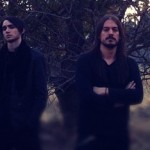
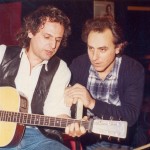
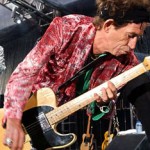

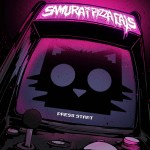
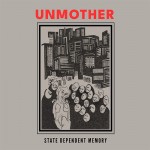
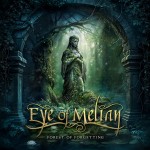



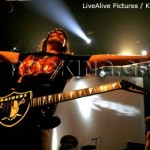
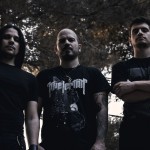
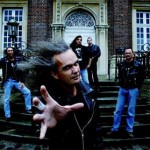

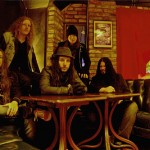

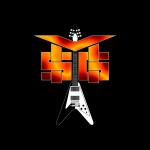
![[7]: Τα blockbuster που σημάδεψαν τα καλοκαίρια μας](https://images.rocking.gr/cine/2014/150x150/summerblockbusters-cover.jpg)
